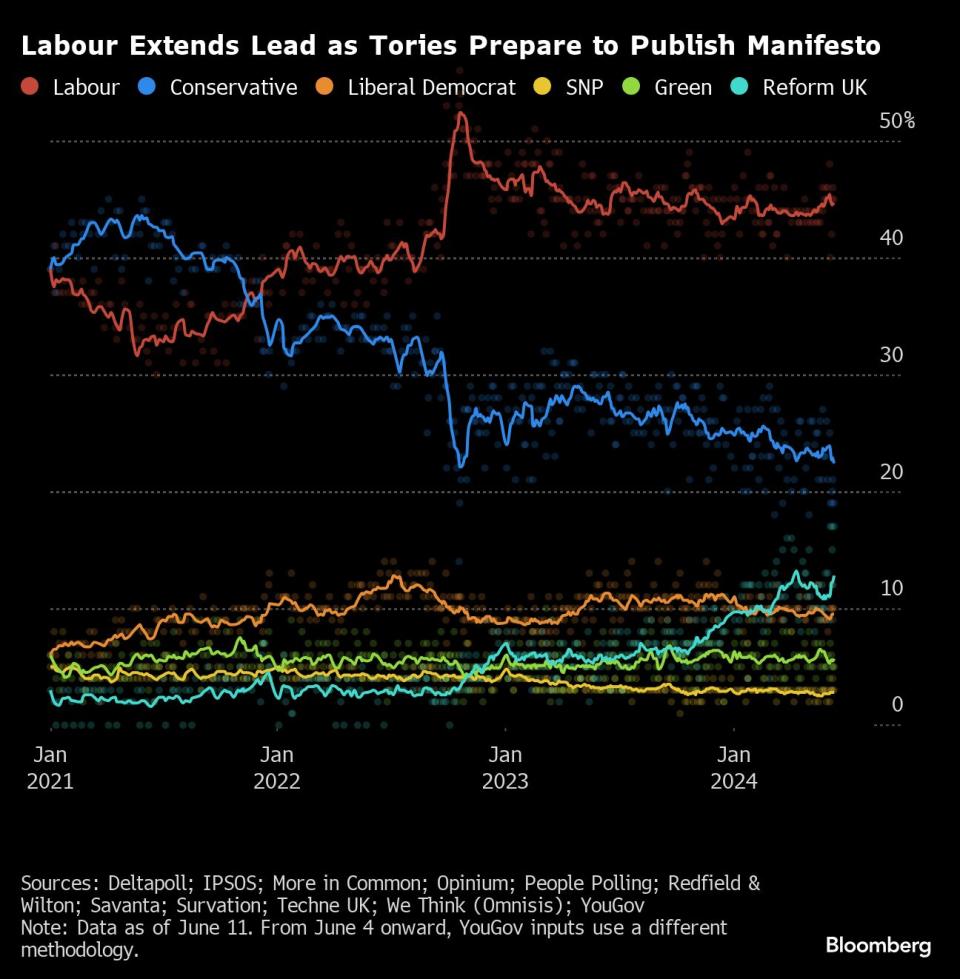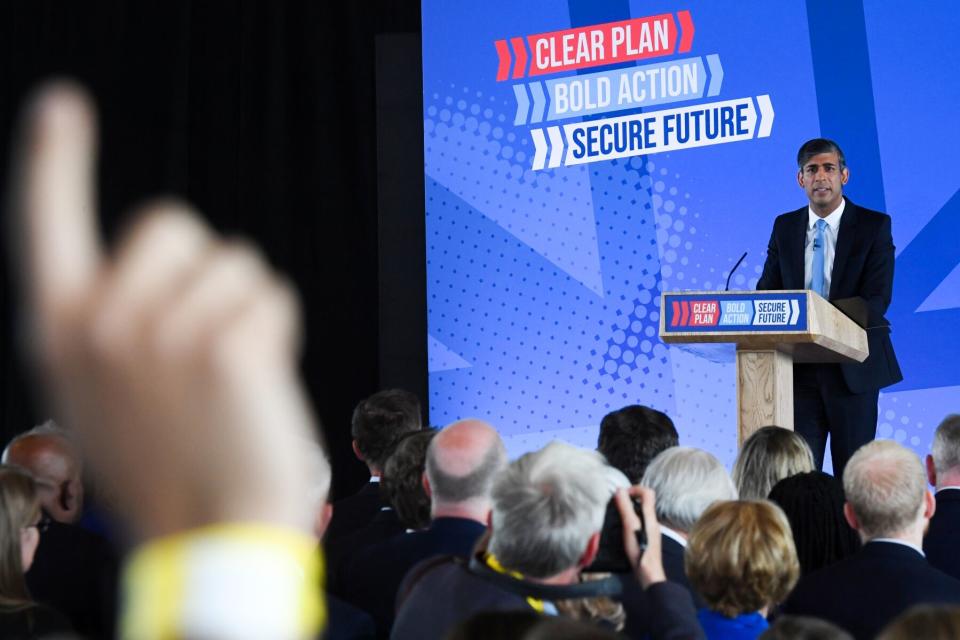Tories Turn on Rishi Sunak’s UK Election Promises Amid Prospect of Defeat
(Bloomberg) -- Conservatives on the left and right of the UK’s ruling party lashed out against Prime Minister Rishi Sunak’s manifesto, saying there’s little prospect the electoral offer will shift opinion polls showing Keir Starmer’s Labour is set for power in next month’s election.
Most Read from Bloomberg
Dozens of CVS Generic Drug Recalls Expose Link to Tainted Factories
Fed’s Higher-for-Longer Stance Hits Firms That Expected Rate Cut
Sunak on Tuesday sought to cast the July 4 vote as a choice between a Tory party offering five different tax cuts — another two percentage points off the national insurance payroll tax, plus breaks for the self-employed, pensioners, parents and first-time property buyers — with a Labour opposition he claimed would raise taxes.
With just over three weeks of the campaign to go, the Tory manifesto launch at the Silverstone motor-racing circuit was seen by many in the party as one of Sunak’s last chances to turn around a 20-point polling deficit that looks certain to end the party’s 14-year stint in government and give Labour a sizable majority.
But candidates and aides on the right of the party told Bloomberg that the offer lacked a game-changing policy on tax or immigration that might help the Tories claw back support that’s drifting to Brexit architect Nigel Farage’s Reform UK party. Several Tory moderates, meanwhile, told Bloomberg they did not understand why Sunak had chosen to again cut national insurance, after two previous reductions at previous fiscal events failed to move polls.
Answering repeated questions from reporters at the event about why the manifesto didn’t contain more eye-catching announcements and policies that hadn’t been previously announced, Sunak insisted the manifesto lived up to the promise of “bold” policies that’s formed the party’s election slogan. In a sign of frustration at how the policy offer was being received by the media, a Tory official later said the manifesto launch was held for the benefit of voters, not for journalists’ entertainment.
To be sure, the prime minister was backed by allies who said his offer of a suite of tax cuts could turn around his party’s election fortunes. Sunak’s team believe that as polling day approaches, more voters will be won over by the promise of tax cuts.
“Undoubtedly this will have an impact,” Cabinet member Michael Gove told Bloomberg at the event. “As we move closer towards election day I’m confident that people, comparing our tax-cutting approach and Labour’s tax raising-approach, will back Rishi Sunak,” he said.
The party’s manifesto costings show tax cuts rising to £17.2 billion ($21.9 billion) a year by 2029-2030 — for a total over five years of £61.9 billion.
Sunak’s aides said a new announcement aimed at reducing taxes for self-employed people would shore up votes among a group of typically Conservative-minded sole traders often characterized in Britain’s tabloid newspapers as “White Van Man.”
Yet outside of the premier’s immediate team, there was little sign of enthusiasm within the Tories.
One minister saw a risk that a middling offer based around a series of individually relatively small tax cuts would leave right-wing voters unhappy and tempted by Reform, while also not doing enough to win over other swing voters who could move to Labour and the Liberal Democrats. Undecided voters are turning their backs on Sunak’s Tories, polling published by Bloomberg on Monday found.
Tory lawmakers on the right of the party had wanted Sunak to pledge to cut inheritance tax, something the premier had considered on multiple occasions since taking office, but ultimately decided against doing. He would have loved to have cut that levy, an aide said, but had decided to prioritize other tax cuts instead.
The premier would only cut tax in a responsible way, the aide added, trying to draw a distinction with his predecessor Liz Truss, whose unfunded tax cuts roiled markets. A late move by some Cabinet ministers to add more eye-catching tax cuts to the manifesto was rejected by Sunak.
Right-wingers had also demanded Sunak make an explicit threat to leave the European Convention on Human Rights, which they blame for the government’s failure to address irregular migration. Faced with a revolt by moderates if he did so, the manifesto only pledged a new commitment to working with allies abroad to change international laws on asylum, and to holding a summit on the subject with other world leaders.
Others were angry at what they saw as a lack of ambition in the manifesto. A Tory aide described it as woeful and embarrassing to be associated with.
Sunak is also facing questions from economists over the credibility of the savings plans announced in a costings document published by the Conservative Party alongside the manifesto. The manifesto looks more likely to lead to higher borrowing, not lower, as it asserts, according to analysis by Bloomberg Economics.
Most Read from Bloomberg Businessweek
China’s Economic Powerhouse Is Feeling the Brunt of Its Slowdown
As Banking Moves Online, Branch Design Takes Cues From Starbucks
Food Companies Hope You Won’t Notice Shortages Are Raising Prices
©2024 Bloomberg L.P.

 Yahoo News
Yahoo News 



